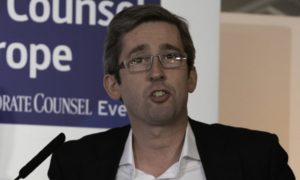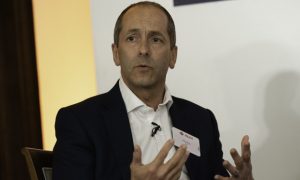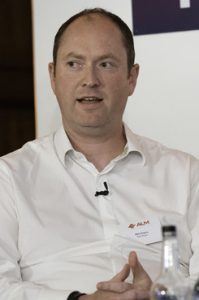The eye of the storm: GC tales from the front line of a corporate crisis
Top lawyers from Tesco, Rolls-Royce and BT recount being at the centre of a corporate scandal
October 08, 2018 at 05:10 AM
10 minute read
What do Rolls-Royce general counsel Mark Gregory, Tesco GC Adrian Morris and former BT GC Dan Fitz have in common? All of them have played a central role in steering their legal team and their companies through high-profile corporate crises.
In a world of 24/7 news and social media, reputations can be made – and lost – in an instant. Add ever-increasing regulatory scrutiny and higher ethical expectations of companies to the mix and we move ever closer to a situation of when, not if, your company is likely to be drawn into a crisis. The odds are increasingly stacked against anyone permanently avoiding the glare of negative headlines – particularly when cyber risks are also taken into consideration.
The good news for GCs is that in the face of increasing regulatory pressure, many have now achieved what they wanted – the ear of the board and a place in the crisis response team. Manage to have as good a crisis as possible, and careers can be made.
But, as BT's new GC Sabine Chalmers, formerly of AB InBev, warns: "You have to be careful what you wish for – with increased influence comes accountability and responsibility."
Fail to live up to expectations under pressure and you may find yourself in the firing line. Here, some GCs who've found themselves in the unfortunate position of being at the centre of a corporate scandal share their experiences and tips for success.
Dan Fitz, the soon-to-be-former company secretary of BT who is next month joining elite scientific research centre the Francis Crick Institute, is used to high-pressure roles. Before joining the telecoms company in 2010 he spent six years at tech company Misys, and before that 12 years at Cable & Wireless, with the company in crisis in his last years there as it found itself downgraded to 'junk' status.
Even so, Fitz (pictured) admits to feeling the strain at times at BT when, in 2017, he found himself overseeing the company's response to an accounting scandal in its Italian arm that emerged via a whistleblower and led to a £500m revision in the company's historic numbers.
Reliving the event, he says: "As GC you're very much in the hot seat, especially when the crisis first breaks. You need to step in, impose order and keep a cool head, even though personally you're stressed."
Adding to the pressure, according to Fitz, is the fact that legal considerations often come second to the reputational need for companies to make a statement before necessarily knowing exactly what happened.
"The company will often have to make a statement before it has all the facts, and it is important to be accurate and candid," he explains. "Your role is to act with speed and bring a methodical approach to bear, while also allowing the business to get onto the front foot."
One of the first things Fitz did before working out exactly how he and his team were going to respond was to contact someone who had been in a similar position before. Tesco's Adrian Morris (pictured) was an obvious choice, given the retail giant had been involved in its own high-profile accounting scandal in 2014 – forced to call in investigators after it emerged that profits had been overstated by £250m, news that wiped about £2bn off the company's value at the time.
Morris recalls: "You go from a standing start to 100 miles an hour, so you have to be able to very quickly stand back and ask yourself how you are going to deal with that intensity. It's multifaceted, so you need to be able to organise your thoughts and allocate people to the right workstreams – watching over it without doing it all yourself."
Today, Morris is restricted in what he can say about the experience as the retrial of two of Tesco's former executives for fraud is beginning this month. However, recounting generically what involvement in a corporate crisis entails from a personal level, he says: "Crises are very stressful, very intense, there are a few personal tests as well as corporate tests. But, you learn a lot – nothing can quite prepare you for it until you're there."
Someone who has most definitely been there and bought the T-shirt is Rolls-Royce's Mark Gregory (pictured). He was at the heart of a five-year global investigation at the engineering company, which ended in 2017 when Rolls-Royce agreed to pay some £671m in fines in order to avoid criminal prosecution in the UK, US and Brazil.
The case, which centred around the historic use of intermediaries in multiple parts of the organisation, resulted in Rolls-Royce agreeing to pay the Serious Fraud Office £500m in a deferred prosecution agreement (DPA) – the single largest-ever bribery fine in the UK.
Says Gregory: "It was an all-encompassing process for five years and, for someone who started out as a finance lawyer in private practice, it was also a massive learning curve. My lasting observation of it is twofold. One, it can be unpredictable. These are global investigations and there are tentacles everywhere – no matter how much planning one does you can never pre-empt everything that is going to happen.
"And secondly, we had to recognise the human element of it all. From the remediation programme to all of the cooperation required in order to get through the DPA, we wouldn't have got to where we did in 2017 without the cultural journey we had to go on as a company."
The day-to-day reality of how each of these GCs chose to tackle their own crisis may have been different (at Rolls-Royce for example, Gregory's immediate team on the investigation numbered just two at times, while others had larger teams) but on other points there is broad agreement about how best to thrive in these circumstances.
All opted to be as open as possible with regulators. As Gregory recounts: "We took a super-cooperative approach. I would take exactly the same approach again, no matter what the cost, because it's the right thing to do. But, it is imperative that you have law firms that you can trust, that are prepared to hold your hand when you're taking this kind of 'beyond the letter of the law'-type approach to your strategy."
➤➤ BAE Systems group GC Philip Bramwell is among a line-up of senior lawyers speaking at LegalWeek CONNECT, which will take place on 28-29 November at County Hall, London SE1, where he will be discussing efforts to improve gender diversity in law. Click here for more information
They all also have very clear ideas about how involved GCs need to be in the event of a crisis, including an immediate need to ensure they are screening all internal and external communication around the crisis.
Says Morris: "In a 24/7 world, the comms challenge is immediate; you need to be clear about who is authorised to talk to the media and what they can say, but you can't say nothing – you can't leave a vacuum. It's also important to think about what you can say internally – colleagues need to know what's happening and you have to be open and transparent."
More broadly, he adds: "The GC has to be at the heart of everything. You can't create a bottleneck, but you need to be involved in all critical decisions and statements."
Fitz agrees with this but warns of the very real need to take care of yourself on a personal level, given that investigations are going to last for a long time, making resilience important.
He comments: "Early on, you need daily briefings to assess and deal with the biggest immediate threat, keep the board informed and manage stakeholders. And somehow you need to find time to sleep too – you need to step back and look after yourself and core team members for the long road ahead."
There is also broad agreement that preparation for these 'black swan'-style events is vital and can make a big difference to the outcome, even if you can never fully prepare for the enormity of an actual crisis.
 Jeremy Drew (pictured), who heads RPC's commercial, IP, technology and media group, advises clients of the need to mock up responses to various crises. "You have to prepare in advance," he says. "The difference between clients who have gone through training and those who haven't is unbelievable. In a mock scenario, those who had been through training knew immediately how to triage everything – the clients who haven't done that training get in crisis and remain in crisis until the fire is almost burnt out."
Jeremy Drew (pictured), who heads RPC's commercial, IP, technology and media group, advises clients of the need to mock up responses to various crises. "You have to prepare in advance," he says. "The difference between clients who have gone through training and those who haven't is unbelievable. In a mock scenario, those who had been through training knew immediately how to triage everything – the clients who haven't done that training get in crisis and remain in crisis until the fire is almost burnt out."
The other area of agreement is that despite the continued pressure on cost-cutting, corporate crises are one area where GCs are less likely to find themselves needing to justify their spending. After all, if your company's entire future is at stake, legal fees sit behind rebuilding the reputation and the business in the list of priorities.
According to Gregory, whose legal and advisory costs of £125m were publicly documented, the key to success lies more in keeping people informed about how much costs are likely to be and if there are any changes than in restricting them.
He explains: "You make sure you keep the board, the chief executive and the CFO up to date with costs. All you can really do is spend a lot of time with the finance team and keep them abreast of the situation, because it costs.
"In such a large, global, criminal investigation, you need to be as confident as you can be that, when you come out the other end, you've got everything, that you know everything. We ended up getting to the point where you do have to boil the ocean and in that context the concept of monthly billing with a narrative that's hundreds of pages long is unworkable."
 Instead, he focused on pushing advisers to try to estimate their costs on a quarterly basis for the coming three months to have as much information to take to his company as possible.
Instead, he focused on pushing advisers to try to estimate their costs on a quarterly basis for the coming three months to have as much information to take to his company as possible.
Do all of this right and help your company come out of the other side of a crisis in the best light possible, with a refreshed culture of compliance, and there are benefits to reap. Gregory, for example, rose from deputy GC to head of legal and commercial to GC at Rolls-Royce during the course of the Serious Fraud Office's four-year investigation into the company.
BAE Systems GC Philip Bramwell observes: "We don't add up the numbers or sell the goods that create the profit, but we do contribute to the creation of an environment that's desired by employees, shareholders, the public and regulators. It's an important time for GCs to demonstrate their value-add – to show courage and leadership. It could be a golden age for corporate lawyers."
Fitz concludes: "In all seriousness, it can be fun for a lawyer to go through this sort of thing. It doesn't feel like it every moment of every day, but it is. It is also a great opportunity for some extensive professional and personal growth."
This content has been archived. It is available through our partners, LexisNexis® and Bloomberg Law.
To view this content, please continue to their sites.
Not a Lexis Subscriber?
Subscribe Now
Not a Bloomberg Law Subscriber?
Subscribe Now
NOT FOR REPRINT
© 2025 ALM Global, LLC, All Rights Reserved. Request academic re-use from www.copyright.com. All other uses, submit a request to [email protected]. For more information visit Asset & Logo Licensing.
You Might Like
View All

Will a Market Dominated by Small- to Mid-Cap Deals Give Rise to This Dark Horse US Firm in China?

Big Law Sidelined as Asian IPOs in New York Dominated by Small Cap Listings

X-odus: Why Germany’s Federal Court of Justice and Others Are Leaving X
Trending Stories
- 1We the People?
- 2New York-Based Skadden Team Joins White & Case Group in Mexico City for Citigroup Demerger
- 3No Two Wildfires Alike: Lawyers Take Different Legal Strategies in California
- 4Poop-Themed Dog Toy OK as Parody, but Still Tarnished Jack Daniel’s Brand, Court Says
- 5Meet the New President of NY's Association of Trial Court Jurists
Who Got The Work
J. Brugh Lower of Gibbons has entered an appearance for industrial equipment supplier Devco Corporation in a pending trademark infringement lawsuit. The suit, accusing the defendant of selling knock-off Graco products, was filed Dec. 18 in New Jersey District Court by Rivkin Radler on behalf of Graco Inc. and Graco Minnesota. The case, assigned to U.S. District Judge Zahid N. Quraishi, is 3:24-cv-11294, Graco Inc. et al v. Devco Corporation.
Who Got The Work
Rebecca Maller-Stein and Kent A. Yalowitz of Arnold & Porter Kaye Scholer have entered their appearances for Hanaco Venture Capital and its executives, Lior Prosor and David Frankel, in a pending securities lawsuit. The action, filed on Dec. 24 in New York Southern District Court by Zell, Aron & Co. on behalf of Goldeneye Advisors, accuses the defendants of negligently and fraudulently managing the plaintiff's $1 million investment. The case, assigned to U.S. District Judge Vernon S. Broderick, is 1:24-cv-09918, Goldeneye Advisors, LLC v. Hanaco Venture Capital, Ltd. et al.
Who Got The Work
Attorneys from A&O Shearman has stepped in as defense counsel for Toronto-Dominion Bank and other defendants in a pending securities class action. The suit, filed Dec. 11 in New York Southern District Court by Bleichmar Fonti & Auld, accuses the defendants of concealing the bank's 'pervasive' deficiencies in regards to its compliance with the Bank Secrecy Act and the quality of its anti-money laundering controls. The case, assigned to U.S. District Judge Arun Subramanian, is 1:24-cv-09445, Gonzalez v. The Toronto-Dominion Bank et al.
Who Got The Work
Crown Castle International, a Pennsylvania company providing shared communications infrastructure, has turned to Luke D. Wolf of Gordon Rees Scully Mansukhani to fend off a pending breach-of-contract lawsuit. The court action, filed Nov. 25 in Michigan Eastern District Court by Hooper Hathaway PC on behalf of The Town Residences LLC, accuses Crown Castle of failing to transfer approximately $30,000 in utility payments from T-Mobile in breach of a roof-top lease and assignment agreement. The case, assigned to U.S. District Judge Susan K. Declercq, is 2:24-cv-13131, The Town Residences LLC v. T-Mobile US, Inc. et al.
Who Got The Work
Wilfred P. Coronato and Daniel M. Schwartz of McCarter & English have stepped in as defense counsel to Electrolux Home Products Inc. in a pending product liability lawsuit. The court action, filed Nov. 26 in New York Eastern District Court by Poulos Lopiccolo PC and Nagel Rice LLP on behalf of David Stern, alleges that the defendant's refrigerators’ drawers and shelving repeatedly break and fall apart within months after purchase. The case, assigned to U.S. District Judge Joan M. Azrack, is 2:24-cv-08204, Stern v. Electrolux Home Products, Inc.
Featured Firms
Law Offices of Gary Martin Hays & Associates, P.C.
(470) 294-1674
Law Offices of Mark E. Salomone
(857) 444-6468
Smith & Hassler
(713) 739-1250












